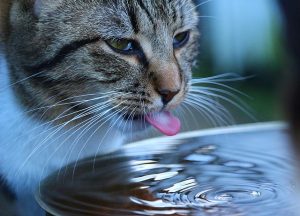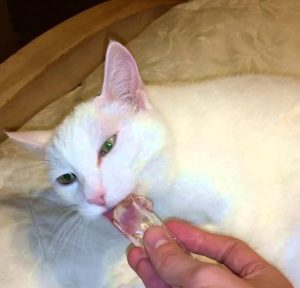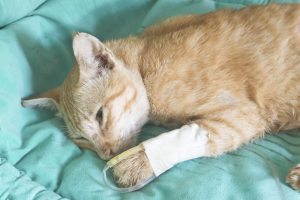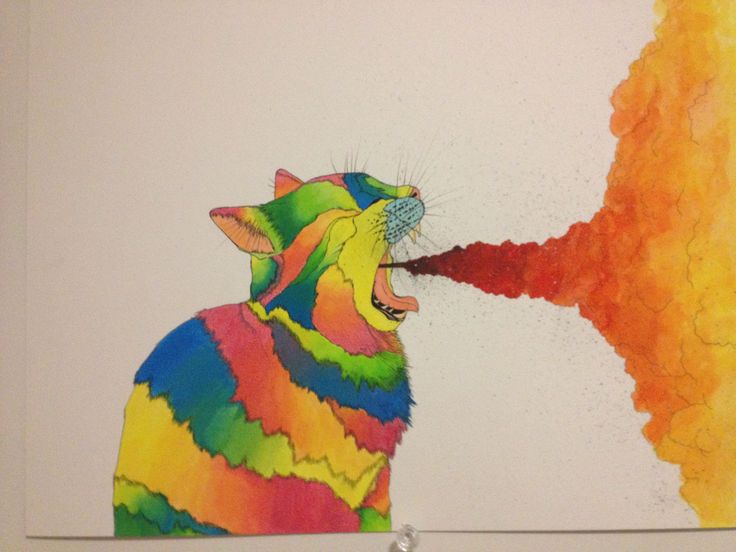If your cat threw up water and you want to know why then you have come to the right place. Cat parents are all too familiar with the sight and sound of a cat that is about to vomit. The drooling, gagging and the forceful movements of the abdominal muscles can come as natural reflexes. Occasional throwing up of water is common even in healthy cats yet still sparks concern amongst cat owners.

Even healthy cats throw up occasionally.
Why is My Cat Throwing Up Water?
Vomiting can be due to a number of different causes. When a cat owner says “My cat threw up water”, it could mean two things. Either the cat vomited water that he drank or vomited stomach juice which is colorless and watery in appearance. When there is something in the stomach that can cause irritation and
inflammation, the cat will throw up gastric juice, which to the owner will look like water. Common stomach irritants are hairballs, foul food, human medicines, poisonous substances, and foreign objects like strings and plastics. Diseases of the stomach like cancer can cause a build-up of toxins in the blood due to Chronic Renal Failure. This leads to irritation of the stomach, occasionally resulting in the cat vomiting gastric juices.

Drinking too much water too fast can stretch the stomach causing cat to throw up.
If your cat threw up water it could be due to the enlargement of its stomach. When a cat drinks too much water too fast, the stomach becomes filled up with water, will be stretched and enlarged causing the cat to throw up water. Conditions that can cause increased thirst and consequently increased water consumption include kidney disease, hyperthyroidism and diabetes mellitus. Tumors and foreign bodies that block the passage of food and water in the stomach can likewise make the stomach distended causing the cat to vomit any water it swallows. Other causes of a cat throwing up water include diseases of the pancreas, motion sickness, excitement and fear to name a few.
Is Throwing Up Water A Cause For Alarm?
If the vomiting (gastric juice or water) occurs only occasionally and for a short period its cause may be benign. This is not a cause for alarm if the cat is showing normal behaviour such as good appetite and energy. Keep an eye on the cat for that hairball to come out or look out for any foreign body in the litter box.
Vomiting is alarming if it is any of the following:
Frequent
Continues for more than 24 hours
Occurs every time a cat drinks water
Occurs on and off for more than once a week
Associated with weakness, loss of appetite, energy and weight
Arrives with observable abdominal pain.
Chronic vomiting can lead to life threatening dehydration, electrolyte and acid-base imbalance and may be an indication of serious medical conditions like diabetes and chronic renal failure.
What Can I Do?

Letting kitty lick ice cubes helps to limit her water intake without her getting dehydrated.
If a cat threw up water, its home-care should begin with giving its stomach a break by fasting for 12 to 24 hours. Offer ice cubes for the cat to lick so that he will not get dehydrated but at the same time not swallow too much water to stretch the stomach and trigger vomiting. If the cat is not vomiting after the fast period, offer a bland diet like rice with boiled skinless chicken in small amounts every 4 hours for 24-48 hours. You can also start to give small amounts of water at a time to see if the cat can hold it down. Another option is to give limited access to a
cat water fountain.

Witholding water can control frequent vomiting but the cat should be on intravenous fluids to prevent dehydration.
If your cat threw up water during or after the fast, take you should take the cat to the vet. Here he can be given medicine to control the vomiting and fluids to correct dehydration. Provide the veterinarian as much accurate information as you can about the problem and other symptoms you might have noticed. The veterinarian will perform a physical examination and order tests to determine the cause and give appropriate medication.






